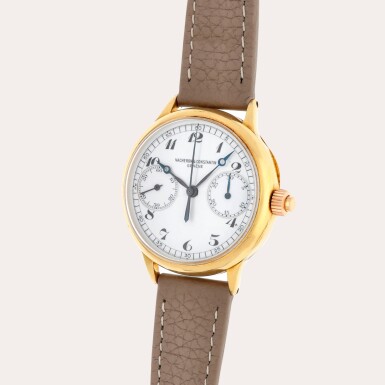Treasures of Time
Treasures of Time
Vacheron Constantin
Reference 3307 | A yellow gold mono-pusher chronograph wristwatch | Made in 1927
Auction Closed
November 10, 10:19 AM GMT
Estimate
40,000 - 80,000 CHF
Lot Details
Description
Dial: white enamel
Calibre: cal. RA 13''' manual winding, 19 jewels
Movement number: 397'240
Case: 18k yellow gold, snap-on hinged cuvette and back with engraving
Case number: 252'045
Size: 34 mm diameter
Signed: case, dial and movement
Box: no
Papers: no
Accessories: Vacheron Constantin Certificate of Authenticity
Christie's, Geneva, May 1995, Lot 318
The single-button chronograph, or chronographe mono-poussoir, emerged as a hallmark of horological innovation during the 1920s and 1930s, often referred to as the golden age of watchmaking. This elegant complication, featuring a single pusher to control the start, stop, and reset functions, became a symbol of understated sophistication. The simplicity and functionality of this mechanism, combined with the aesthetic beauty of enamel dials, have ensured these watches remain timeless classics, highly coveted by collectors today.
According to extensive research, only approximately 22 examples of Vacheron Constantin’s Reference 3307 were ever produced, making this reference exceptionally rare. Powered by a 13''' caliber based on an ebauche from Rochat Frères, the company that later became known as Valjoux, these timepieces feature movements recognized for their precision and quality. Valjoux would go on to become one of Switzerland’s most prestigious movement manufacturers, and the Reference 3307 stands as a testament to the early mastery of the chronograph complication.
What further elevates the historical importance of Reference 3307 is its ownership by prominent figures of 20th-century European history. Two of these extraordinary timepieces, produced in 1927, were commissioned for none other than King Alexander I of Yugoslavia—identified as Lots 7 and 8. King Alexander’s connection to these watches, made during his reign, adds immense value both in terms of craftsmanship and provenance.
Another example, Lot 9, was gifted by Alexandros Papanastasiou, the former Prime Minister of Greece, further highlighting the model’s appeal to influential leaders of the time. Additionally, one Reference 3307 is believed to have been presented by Josip Broz Tito, the future leader of Yugoslavia, to General Dapčević following the liberation of Belgrade, symbolizing gratitude and esteem during a critical moment in Yugoslavian history.
From a historical perspective, King Alexander I (16 December 1888 – 9 October 1934) played a pivotal role in early 20th-century European history, navigating a complex political landscape. Educated in Geneva, Alexander’s exposure to Swiss culture and its fine craftsmanship may have influenced his appreciation for Vacheron Constantin timepieces. Following his father’s death in 1921, he became the ruler of the Kingdom of Serbs, Croats, and Slovenes, later known as Yugoslavia. His reign was marked by political challenges, as he worked to unify a diverse and divided nation.










